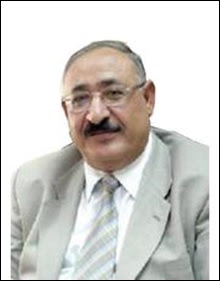by MEMRI
"Conspiracy theories have spread to most areas of life in our Arab world, and their proponents apply them to every event that occurs, to the point that we hear explanations that evoke derision and laughter and fly in the face of logic and common sense".
 |
| 'Abd Al-Hamid Al-Majjali
(image: Al-Dustour, Jordan)
|
In his July 17, 2017 column, 'Abd Al-Hamid Al-Majjali, columnist for the Jordanian daily Al-Dustour,
wrote that the Arabs tend to believe in conspiracy more than any other
people in the world. He added that, although this tendency is partly
justified, since the West has indeed interfered in the Arab countries
and brought disasters upon them, it is irrational to apply conspiracy
theories to all events occurring in the Arab world today, such as the
Arab Spring revolutions. He warned that the tendency to resort to such
theories harms the Arabs by thwarting any efforts of change and reform.
The following are excerpts from his article:[1]
"The Arabs
seem to believe in conspiracy theories more than any other people in the
world and [constantly] use them to explain events, political, social
and other. Such theories are reassuring and require little mental
effort. They do away with logic as long as there is some ready-made
concept that can be utilized and believed at any given time and in any
give place.
"History is
full of [genuine] conspiracies, and what causes the Arabs to resort to
conspiracy theories more than other [peoples]... is the dark history of
the other, namely the West, in its relations with the Arab region. The
past barbarity of the West – [barbarity] that today [takes the form of]
gentler intervention in our region and hides behind false humane
principles – was the reason for most of our disasters, whose
repercussions are still felt today and will continue to be felt [even]
in the distant future...
"Although
this justifies the Arabs' penchant for conspiracy theories, it is
nevertheless unrealistic and irrational to explain every event as an
outcome of some foreign plot hatched in dark chambers in the West...
[The tendency to] ignore the real reasons for the changes and events in
our lives and blame them on others keeps us from analyzing events
objectively, and thus thwarts any attempt at change or internal reform,
as long as [we continue to believe that] the reason for events is the
other and not our own misdeeds...
"Conspiracy
theories have spread to most areas of life in our Arab world, and their
proponents apply them to every event that occurs, to the point that we
hear explanations that evoke derision and laughter and fly in the face
of logic and common sense.
"The
proponents of these theories dismiss [the notion that] the Arab peoples
are capable of acting and rising up against tyranny. As far as they are
concerned... the Arab Spring was a foreign conspiracy in which external
forces embroiled the Arab peoples in a rebellion against their own
rulers. Who [can] believe that Western intelligence [agencies] selected a
police station in one of the cities of southern Tunisia and arranged
with [the policemen there] to target the vendor [Muhammad]
Bouazizi,[2] and later incited the people of that city to protest
against police oppression, so that the protests spread to the rest of
Tunisia and people rose up against the oppression of the Bin Ali regime?
Wasn't that what happened? And who [can] believe that Western
intelligence entered one of the homes in the [Syrian] city of Dera and
encouraged some kids – who for weeks had been watching the masses chant
'the people want to topple the regime' on the satellite channels – to go
out and naively scribble this slogan on a wall? Since the [Syrian]
regime is foolish and oppressive, it used oppressive measures against
these kids and their families and committed criminal acts – and this was
the seed of the Syrian revolution. Had the Syrian regime acted wisely
at that moment, nothing would have happened...
"Some people
even doubt the existence of ISIS after everything that happened and is
still happening, and ask where the ISIS [fighters] in Mosul have
disappeared. Do you really need to ask that? They are dead and
underground. They were buried without it appearing on the [television]
screens. Did you see the bodies of the Iraqi soldiers who were killed by
the thousands? Armies do not exhibit the bodies of [their] dead during a
war. Did we see [pictures of] the Egyptian soldiers killed last week in
Sinai?
"This is
nonsense. It is the malady of conspiracy theories... which keeps the
Arab mind from [recognizing] the accurate facts, even the most
self-evident of them. True, there was foreign intervention which led the
popular uprisings to be hijacked for many reasons, too numerous to list
here. But it was the Arab peoples who carried out these uprisings,
without anyone prompting them or conspiring [against them]... These were
spontenuous revolutions that were later diverted from their original
course by outside elements.
"It will be a
long time before conspiracy theories are subjected to scientific and
rational thought that explains events [in an objective manner], at least
in the Arab region. These theories still infiltrate the Arabs'
collective mind, driving out reason – and that is just one of our
innumerable disasters."
[1] Al-Dustour (Jordan), July 17, 2017.
[2] A
Tunisian street vendor who set himself on fire on 17 December 2010 after
the authorities confiscated his wares. The incident was a catalyst for
the Tunisian Revolution and the broader Arab Spring.
MEMRI
Source: www.memri.org
Follow Middle East and Terrorism on Twitter
Copyright - Original materials copyright (c) by the authors.
No comments:
Post a Comment